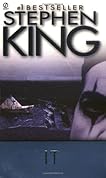Until a couple of years ago I had read a total of two Stephen King novels, both in high school: The Stand and The Eyes of the Dragon. He came into town when I was working at Davis Kidd in Nashville, Tennessee–back when it was an independent bookstore and King was doing his motorcycle tour of independent bookstores. So at one time I owned a hardback of Insomnia and a matching T-shirt (but I didn’t go to his presentation). This would have been around 1993. I notice that now King is doing video interviews with Barnes and Noble and what was once the nation’s largest bookstore in Saint Louis, The Library Limited, stands empty last I checked. So the borg won.
But I digress, and I still love Barnes & Noble.
Anyway, I picked up the hardback of On Writing on a remainder table somewhere and really enjoyed it–and appreciated him both as a writer and a human being.
So I checked out Cell from the library, which I would have enjoyed a great deal more if I had ever read Richard Mathison, but enjoyed anyway. Then I read Salem’s Lot which was much better than Bram Stoker’s Dracula. I moved on from there to The Dead Zone and then finally Carrie (“Finally” here means that he wrote about writing that book in his On Writing and I had been wanting to read it for some time to get a complete picture). Recently I picked up Needful Things and It from the library. But time and emotional drain simply didn’t give me the kick I needed to start making headway in those thick books. So I have returned them for another day. Right now I am about half-way through Firestarter.
Cell and Salem’s Lot have some similarities, but they both strike me as rather original productions. Others are also original, but they more obviously come from Planet Stephen King, where raving lunatic religious women and powerful but uncontrolled girls roam the landscape, and God works in undeniable but senseless ways.
There seems to be, in other words, a few themes or characters that keep finding ways into many of King’s books.
If I recall correctly, The Dead Zone came after The Stand. Both are concerned with the problem of evil. Specifically, how can God send anyone to meaningfully battle against evil if, in fact, he is omnipotent? Why give Johnny Smith, for example, a brain injury that lets him see the future and not give the bad guy he must confront a brain injury that makes him no longer a danger? (I don’t know if King believes in a personal God, but he does seem to think there are mysterious forces at work beyond Newtonian cause-and-effect.)
Reading Firestarter I am obviously meeting Carrie again. This time, however, she doesn’t have psychotic parents. She has good parents who love her and are trying their best to help her. And she still has problems! (Of course, the psychotic fictional Intelligence agency does a lot of damage in the place of Carrie’s mother.)
There are passages about a psycho teen boy and his care in Carrie that I know are the seeds for the later book Christine.
Carrie’s mother is an insane religious fanatic. At first, this seemed entirely arbitrary–a stupid stereotype motivated by need. (The idea of Protestant religious believers that think sex is at best a necessary evil is a recurring myth that one has to try to believe in many of King’s books). But as the story progresses one sees that King does work on developing a compelling history that explains her mentality. In The Dead Zone there is another insane religious mother (who believes that Jesus rides in UFOs) but she turns out differently because she has people who love her and it helps her move in a better path.
So, rather than being boring, the similar characters in different circumstances are actually kind of thought-provoking.
King’s protagonists are not (often?) sexually moral. And I often get almost a nihilistic vibe that bothers me. There are also places in Salem’s Lot that make it clear that King is every bit as gifted as a writer as Ray Bradbury. I’m tempted to say that he does for small-town Maine in the seventies what Bradbury did for Middle America small-town life in the 1930s or so.
 Their faces were different in all ways but similar in one: They looked oddly incomplete, like pictures with holes for eyes or a jigsaw puzzle with a minor piece missing. it was the lack of desperation, Richards thought. No wolves howled in these bellies. These minds were not filled with rotted, crazed dreams or mad hopes.
Their faces were different in all ways but similar in one: They looked oddly incomplete, like pictures with holes for eyes or a jigsaw puzzle with a minor piece missing. it was the lack of desperation, Richards thought. No wolves howled in these bellies. These minds were not filled with rotted, crazed dreams or mad hopes.
